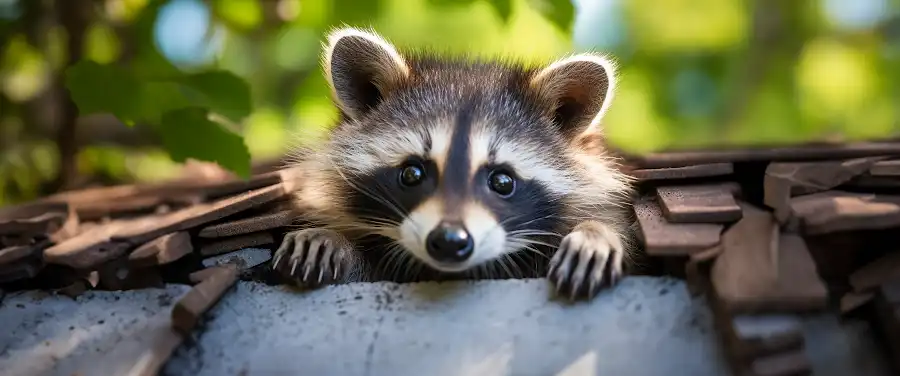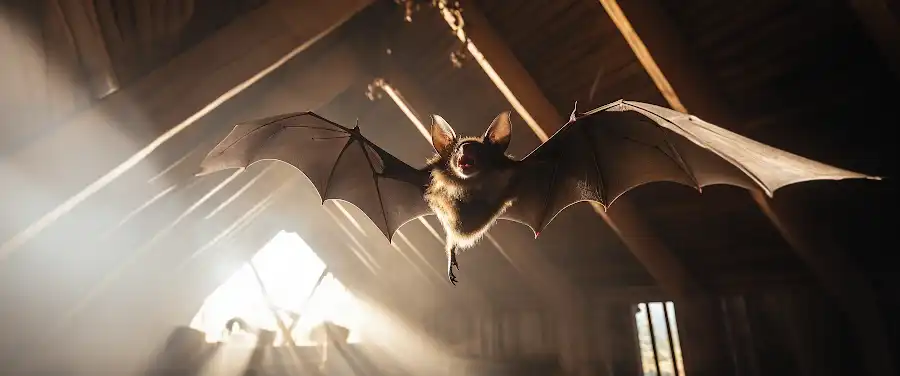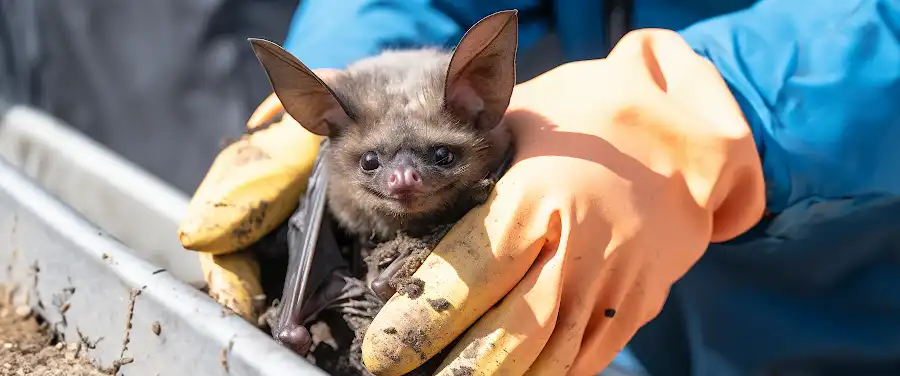
Ever heard those mysterious scratches in your attic and traced it to a pair of twinkling eyes in the dark? Odds are, you’ve met your stealthy attic dweller – the raccoon. These seemingly innocent critters are famous for their extreme adaptability, especially in urban landscapes. But have you ever considered the health risks that could come knocking with their cute snouts and bushy tails?
Your attic, a peaceful and dust-covered space of your house, might not be as safe as you think. Did you know that interacting with raccoons brings not just adorable Instagram-worthy moments but also a host of health implications? While raccoons can cause considerable mayhem with their nocturnal antics, it’s the hidden danger of zoonotic diseases that should have you reaching for Wildlife Control. Hold onto your hats, because we’re about to dive deep into the shadowy world of urban raccoon populations and their stealthy health risks.
Understanding the health risks associated with raccoons goes beyond their tendency to topple-over trash cans or make a mess of your attic. These mischievous marauders might seem amusing, but their presence can have severe consequences, turning your serene dwelling into a ticking health hazard. It’s a hidden side to our raccoon problem, putting them and us, their unintentional human neighbors, on a dangerous crossroad. Ready to uncover the reality behind these bushy-tailed burglars? Let’s delve right in and to the next section. Let’s uncover: “Why Should We Care About Raccoons in our Attics?”
What Diseases are Associated with Raccoons?

Raccoons, cute as they may seem, can be a source of several concerning diseases for humans. When these masked bandits take up residence in your attic, they don’t just bring noise and mess — they also bring potential health hazards to your home.
The most notable Raccoon-related diseases include Rabies, Leptospirosis, Roundworm, and Tetanus. There’s also a potential risk of other zoonotic diseases, which can jump from animals to humans.
Now let’s scrutinize these diseases one by one, to better understand how each one poses a threat to human health in terms of symptoms and transmission.
| Disease | Symptoms | Transmission |
|---|---|---|
| Rabies | Fever, headache, muscle aches, loss of appetite, nausea | Bite, scratch, contact with saliva |
| Leptospirosis | High fever, headache, chills, muscle ache, vomiting, jaundice, red eyes | Contact with urine, bite |
| Roundworm | Abdominal pain, loss of appetite, tiredness, weight loss, upset stomach | Ingestion of eggs found in raccoon feces |
| Tetanus | Stiffness in jaw and neck muscles, difficulty swallowing, fever, sweating | Wound contamination |
How is Rabies Transmitted by Raccoons?
Rabies is perhaps the most well-known disease associated with raccoons. But how does this work exactly? Well, Rabies is a zoonotic disease, meaning it can easily spread from animals to humans. The symptoms of rabies typically include fever, headache, and general weakness or discomfort.
The rabies transmission from raccoons to humans usually happens through a bite or a scratch that results in an open wound, thereby allowing the virus a pathway into the body. The saliva of an infected raccoon can carry the rabies virus, which can enter the human body through the wound site, leading to the potential onset of this fatal disease.
What is Leptospirosis and How Can Raccoons Spread It?
Leptospirosis is another disease that people can contract from raccoons. The symptoms of Leptospirosis include high fever, headache, chills, muscle aches, and vomiting. Severe cases can lead to kidney damage and meningitis.
So, how is Leptospirosis transmitted from raccoons to humans? The primary method of Leptospirosis disease transmission by raccoons is through their urine. Infectious organisms in the urine seep into soil or water and humans get infected when they come in direct contact with contaminated areas.
Can Raccoons Transmit Roundworm to Humans?
Yes indeed, raccoons can transmit a particular type of roundworm known as Baylisascaris procyonis to humans. The infection often begins with relatively mild symptoms like abdominal pain, loss of appetite, and tiredness. But untreated, it can cause serious complications, even potentially eye damage and brain disorders!
Raccoons infected with this parasite shed microscopic roundworm eggs in their feces. Humans can then become infected by ingesting these eggs inadvertently, making it imperative to avoid directly handling raccoon feces or soil where raccoons defecate.
Possible Transmission of Tetanus via Raccoons
Tetanus is a serious bacterial disease that affects the nervous system and leads to painful muscle contractions. While direct transmission from raccoons is less common, humans can get tetanus if a wound or break in the skin comes in contact with raccoon feces, saliva, or urine. So if you get a bite or a scratch from a raccoon, professional medical examination is just absolutely necessary. Remember, prevention is always better than cure!
As we can see, while raccoon interactions might seem harmless or even cute, they have a hidden danger. From an innocent-looking scratch or bite to stepping barefoot where a raccoon might have relieved itself, risks are present in various forms. Now that we’ve covered the human side, our next topic gravitates around how raccoons can affect our pet’s health — because as we know, what is harmful to us can be equally bad for our furry friends.
How Can Raccoons Affect Our Pets’ Health?

Raccoons may look harmless and even cute, but they can pose serious health risks to our pets if allowed near them. These critters can carry a variety of zoonotic diseases that can be transmitted to your pets and, in some cases, even to you. When talking about raccoons and pet health, it’s important to understand the potential risks involved.
One common disease that raccoons can transmit to pets is rabies. According to a report by the Centers for Disease Control and Prevention(CDC), “out of approximately 6,000 reported cases of rabies in wildlife in the U.S in 2017, 30% were in raccoons.” This highlights the significance of rabies as a potential health risk linked to raccoons.
Moreover, parasites such as roundworms and ticks often find their homes in raccoons. In case of contact, pets can end up as hosts of these parasites, leading to diseases such as Lyme disease and other pet diseases.
In light of these threats, ensuring a comprehensive veterinary care regimen for your pets becomes essential. This typically includes regular check-ups, deworming and most importantly, timely pet vaccinations. As the adage goes, prevention is better than cure, and this couldn’t be more true when it comes to protecting your pets from zoonotic diseases.
Did you know that the effectiveness of a rabies vaccine ranges between 93% to 98% for domestic pets? A study published in the Journal of Veterinary Medicine affirms this, verifying that vaccinations play a crucial role in preventing the spread of such diseases from raccoons to your beloved pets.
To summarize, while raccoons might not directly harm your pets, they can act as carriers for various hazardous diseases. Ensuring that their vaccinations are up to date, thereby boosting their immunity, can be a powerful shield against these raccoon-related health risks.
Conclusion
As we conclude, it’s important to underscore the various health risks associated with raccoons. These seemingly harmless critters may appear cute and cuddly, but they can pose serious threats to your wellbeing, especially if they’ve chosen your attic as their temporary dwelling.
Raccoons are known to carry several diseases such as Rabies, Leptospirosis, and Roundworm, which can easily be transmitted to humans and even your beloved pets. Not to mention, they can cause notable structural damage to your home and attic, leading to hefty repair bills.
That being said, we can’t ignore the fact that raccoons are part of our ecosystem, so learning to live responsibly alongside wildlife without harming ourselves is key. Simple preventative measures such as securing the lids of your trash cans and inspecting and maintaining the structure of your home can ensure these creatures stay in their natural habitat and we stay safe.
Don’t forget, ensuring our health and that of our family is not a luxury but a necessity. Having raccoons in your house is not just about the damage to your property; it’s a matter related to your health and wellbeing. You must take precautions and contact your local animal control or wildlife professional if you suspect a raccoon is living in your home.
To encapsulate, while raccoons can be daunting guests to have in your abode due to their destructive nature and the various diseases they might carry, it’s imperative to bear in mind that they are simply animals trying to survive. As residents sharing the planet with them, we need to find a balanced way of cohabitating with these critters; after all, they were here long before us.
So, remember, the next time you hear something stirring in your attic, don’t shrug it off – it could be a potentially unhealthy, not to mention destructive, critter nesting up there. Be vigilant and take necessary action promptly!




